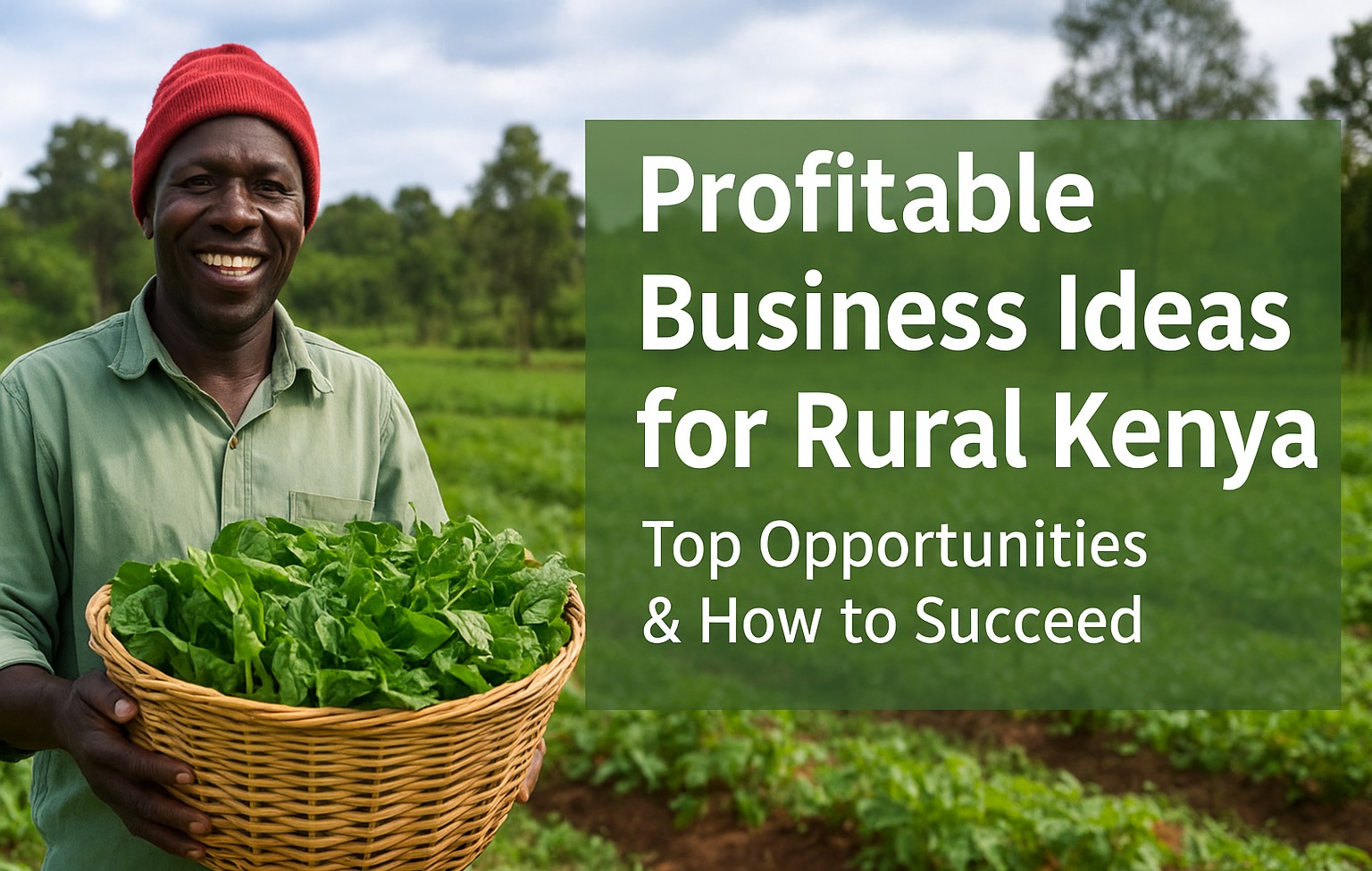

Titus Morebu
Author
Profitable Business Ideas for Rural Kenya: Top Opportunities & How to Succeed
Discover high-potential rural Kenya business ideas, from agribusiness to value-added ventures, that match local needs and modern trends for lasting profit.
Rural Kenya is full of untapped potential. With growing infrastructure, rising technology access, and stronger market linkages, rural entrepreneurs have more opportunity than ever before. This post explores profitable business ideas tailored for rural settings in Kenya, together with practical steps to turn them into success stories. 💡
Why Rural Kenya Is a Great Place to Start a Business
- Natural resources and land availability: More affordable land, access to farmland, water sources, forestry, etc.
- Growing demand: Local demand for food, processed produce, clean energy, and services continues rising as rural incomes improve.
- Improving infrastructure and connectivity: Better roads, mobile networks, and digital payment systems (like M-Pesa) enable business operations in remote areas.
- Supportive policy & financing: More government and NGO programs aimed at smallholder farmers, value-addition, and green energy are becoming available.
Top Profitable Business Ideas for Rural Kenya
Agribusiness & Livestock Ventures
- Dairy Farming with Value-Addition: Raising cows or goats for milk, plus making butter, yoghurt, cheese, or pasteurised milk. Local schools, hospitals, and urban markets are good buyers.
- Poultry (Broilers & Layers): Eggs and meat are high demand. Kienyeji breeds for local preference combined with efficient feed and housing can yield good profit margins.
- Fish Farming: Species like tilapia and catfish in ponds or tanks. Requires water management, good feed, and access to market; but yields can be high.
- Bee-keeping & Honey Products: Low setup cost, and besides honey, wax, propolis and beeswax products add value. Organic or specialty honey can fetch premium prices.
- Snail Farming: Often overlooked but highly profitable. Requires little space, low feeding costs, and meats/waste products are used in food, cosmetics or export niches.
- Mushroom Cultivation: Fast turnaround, can be grown indoors, valuable in restaurants and urban consumers seeking fresh produce.
- High-Value Crops & Orchards: Avocado, macadamia, specialty citrus, coffee (especially organic/specialty grades), tea. These crops do well in certain high altitude or fertile areas with proper inputs and quality management.
Value Addition, Processing & Services
- Agro-processing: Turning raw produce (milk, fruits, nuts, tea) into processed goods (juices, dried fruits, oils, powdered or packaged products) increases shelf life and margins.
- Cold Chain & Storage: Coolers or refrigerated storage for perishables—vegetables, fruits, dairy—can reduce losses and allow selling when prices are better.
- Renewable Energy & Clean Tech: Solar mini-grids, biogas digesters, solar dryers; these solve energy access issues and enable value-added processing or service provision (charging phones, lighting, etc.).
- Water Harvesting & Irrigation Services: Supplying/co-installing drip irrigation, small pumps. Reliable water improves productivity especially during dry seasons.
- Handicrafts & Artisan Products: Local crafts such as weaving, textiles, woodwork, baskets. Branding + online sales can open international markets.
- Packaged Food & Snacks: Locally made snacks, baked goods, traditional foods packaged attractively. Schools, markets, buses can be customers.
Community & Niche Services
- Daycare / Early Childhood Education Centers: Parents working on farms, or in towns, often lack local quality childcare; providing safe, educational centers is valued.
- Health & Wellness Services: Basic clinics, herbal clinics, clean water kiosks, sanitation services. Even solar-powered mobile clinics have scope.
- Eco-tourism and Agro-tourism: Hosting farm stays, guided tours, nature walking, bird watching. For regions with natural beauty or cultural heritage, this is growing.
- Logistics & Transport Services: Helping move goods from farms to market. Transport of inputs, produce; small haulage; courier service for rural-urban linkages.
- Digital Services & Remote Work: Given better internet, skills like graphic design, content creation, tutoring, online store management, social media marketing can employ youth in rural areas.
How to Choose the Best Business for Your Context
Assess Local Resources & Conditions
- Soil type, climate, rainfall patterns (for crops or livestock).
- Access to water, roads, electricity or renewable energy sources.
- Available labor and skills within community.
- Existing competition and local demand—don’t pick something that’s already saturated without differentiation.
Consider Capital, Risk & Return Timeframe
- Estimate startup cost vs monthly running costs (feed, inputs, transport, energy).
- Think how long before cash flow: some ventures like mushrooms or poultry may give returns quickly; others like orchards take years.
- Risk factors: weather, pests, diseases, market price fluctuations.
Link with Markets & Value Chains
- Find off-takers (buyers) before production: schools, local stores, processors, exporters.
- Explore cooperatives or farmer groups to reduce costs of inputs, increase bargaining power.
- Use digital platforms to market and sell – social media, WhatsApp, online marketplaces.
Essential Tips for Running a Successful Rural Enterprise
- Innovation & Adaptation: Try improved breeds, climate-smart agriculture, hybrid seeds, low-cost irrigation, or agroforestry to adapt to changing climate.
- Quality & Consistency: Even rural customers and urban buyers care about reliability, hygiene, packaging. Building trust is key.
- Manage Finances Well: Track costs, reinvest profits wisely, keep records. Explore savings groups or microfinancing where useful.
- Leverage Government & NGO Support: Grants, training programs, agricultural extension services are often available.
- Sustainable Practices: Soil conservation, water harvesting, renewable energy—both good for environment and appeal to eco-conscious markets.
- Branding & Marketing: Even rural enterprises benefit from a strong brand, good packaging, and telling your story—why your produce is special (organic, free-range, fair trade etc.).
Case Studies & Models to Learn From
- Coffee Farming with Specialty Organic Certification: Small farms of Arabica that shift to organic methods often access premium markets and higher margins.
- Forest Farming & Tree Planting: Models where farmers grow timber, fuelwood, or intercropped trees; example: distributed forestry schemes that support smallholders from seed to harvest.
- Cooperative Milk Collection & Small-Scale Dairy Processing Plants: Communities pooling milk, cooling, processing locally rather than transporting large distances raw.
- Solar Mini-Grid Communities: Areas where off-grid energy enables businesses: cold storage, charging stations, value addition etc.
Challenges to Be Aware Of
- Climate change and erratic rainfall—risk mitigation essential (rainwater harvesting, drought tolerant crops).
- Pests, diseases, and post-harvest losses—need proper storage, pest control, good practices.
- Access to finance and credit—interest rates, collateral requirements may block entry.
- Market volatility & road/access issues—bad roads make transport expensive and spoil perishables.
- Regulation, licensing, certifications—which may be costly or require time.
Final Thoughts
If you live in or are thinking of investing in rural Kenya, there has never been a better time. By combining the natural advantages you already have with smart business choices, modern marketing, and sustainable practices, rural enterprises can compete strongly. Pick an idea that fits your local context, manage it well, and stay adaptable—and you'll be set for lasting profit and impact. 🚀
To get started today, try small pilot projects—test product quality or demand on a small scale before scaling. Ask around your community what people need. Sometimes the best ideas are right at home.
Gallery

Related Articles
3 articles
How TitoCreations Empowers Kenyan Entrepreneurs With Smart Business Systems
Discover how TitoCreations equips Kenyan entrepreneurs with profitable business ideas and modern software systems to start, manage, and scale successful ventures.

How to Start Poultry Farming in Kenya 2026: A Complete Step-by-Step Guide to Profit
Learn how to start and run a profitable poultry farm in Kenya in 2026 with up-to-date setup, costs, management, marketing, and profit strategies.

Freelancing in Kenya: How to Start With No Experience 2026
Learn how to start freelancing in Kenya with zero experience, build marketable skills, find clients, and earn KES or dollars online in 2026.